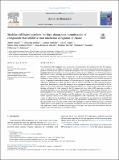Files in this item
Modular cell-based platform for high throughput identification of compounds that inhibit a viral interferon antagonist of choice
Item metadata
| dc.contributor.author | Vasou, Andri | |
| dc.contributor.author | Paulus, Christina | |
| dc.contributor.author | Narloch, Janina | |
| dc.contributor.author | Gage, Zoe O. | |
| dc.contributor.author | Rameix-Welti, Marie-Anne | |
| dc.contributor.author | Eléouët, Jean-François | |
| dc.contributor.author | Nevels, Michael | |
| dc.contributor.author | Randall, Richard E. | |
| dc.contributor.author | Adamson, Catherine S. | |
| dc.date.accessioned | 2018-01-03T16:30:12Z | |
| dc.date.available | 2018-01-03T16:30:12Z | |
| dc.date.issued | 2018-02 | |
| dc.identifier | 251360897 | |
| dc.identifier | c0c40db6-8e11-46ff-8c5a-db9324fdb3a5 | |
| dc.identifier | 85038848883 | |
| dc.identifier | 000425078700010 | |
| dc.identifier.citation | Vasou , A , Paulus , C , Narloch , J , Gage , Z O , Rameix-Welti , M-A , Eléouët , J-F , Nevels , M , Randall , R E & Adamson , C S 2018 , ' Modular cell-based platform for high throughput identification of compounds that inhibit a viral interferon antagonist of choice ' , Antiviral Research , vol. 150 , pp. 79-92 . https://doi.org/10.1016/j.antiviral.2017.10.012 | en |
| dc.identifier.issn | 0166-3542 | |
| dc.identifier.other | ORCID: /0000-0003-4051-4658/work/54516601 | |
| dc.identifier.other | ORCID: /0000-0002-7115-407X/work/37898080 | |
| dc.identifier.other | ORCID: /0000-0002-4123-5629/work/47136633 | |
| dc.identifier.other | ORCID: /0000-0002-9304-6678/work/60426968 | |
| dc.identifier.other | ORCID: /0000-0001-7673-5212/work/60630448 | |
| dc.identifier.uri | https://hdl.handle.net/10023/12414 | |
| dc.description | The work was supported by the Medical Research Council, U.K. (University of St Andrews Doctoral Training Grant to AV and CSA), Deutsche Forschungsgemeinschaft (PA 815/2-1) to CP, Tenovus Scotland (T15/38) to MN and Wellcome Trust to CP, MN (ISSF) and RER (101788/Z/13/Z) | en |
| dc.description.abstract | Viral interferon (IFN) antagonists are a diverse class of viral proteins that counteract the host IFN response, which is important for controlling viral infections. Viral IFN antagonists are often multifunctional proteins that perform vital roles in virus replication beyond IFN antagonism. The critical importance of viral IFN antagonists is highlighted by the fact that almost all viruses encode one of these proteins. Inhibition of viral IFN antagonists has the potential to exert pleiotropic antiviral effects and thus this important protein class represents a diverse plethora of novel therapeutic targets. To exploit this, we have successfully developed and executed a novel modular cell-based platform that facilitates the safe and rapid screening for inhibitors of a viral IFN antagonist of choice. The platform is based on two reporter cell-lines that provide a simple method to detect activation of IFN induction or signaling via an eGFP gene placed under the control of the IFNβ or an ISRE-containing promoter, respectively. Expression of a target IFN antagonist in the appropriate reporter cell-line will block the IFN response and hence eGFP expression. We hypothesized that addition of a compound that inhibits IFN antagonist function will release the block imposed on the IFN response and hence restore eGFP expression, providing a measurable parameter for high throughput screening (HTS). We demonstrate assay proof-of-concept by (i) exploiting hepatitis C virus (HCV) protease inhibitors to inhibit NS3-4A's capacity to block IFN induction and (ii) successfully executing two HTS targeting viral IFN antagonists that block IFN signaling; NS2 and IE1 from human respiratory syncytial virus (RSV) and cytomegalovirus (CMV) respectively, two clinically important viruses for which vaccine development has thus far been unsuccessful and new antivirals are required. Both screens performed robustly and Z′ Factor scores of >0.6 were achieved. We identified (i) four hit compounds that specifically inhibit RSV NS2's ability to block IFN signaling by mediating STAT2 degradation and exhibit modest antiviral activity and (ii) two hit compounds that interfere with IE1 transcription and significantly impair CMV replication. Overall, we demonstrate assay proof-of-concept as we target viral IFN antagonists from unrelated viruses and demonstrate its suitability for HTS. | |
| dc.format.extent | 2481635 | |
| dc.language.iso | eng | |
| dc.relation.ispartof | Antiviral Research | en |
| dc.subject | Viral interferon (IFN) antagonists | en |
| dc.subject | Antivirals | en |
| dc.subject | Human Respiratory Syncytial Virus (RSV) | en |
| dc.subject | Human Cytomegalovirus (CMV) | en |
| dc.subject | High-throughput screening (HTS) | en |
| dc.subject | Signal transducer and activator of transcription 2 (STAT2) | en |
| dc.subject | QR355 Virology | en |
| dc.subject | QR180 Immunology | en |
| dc.subject | QH426 Genetics | en |
| dc.subject | Biochemistry, Genetics and Molecular Biology(all) | en |
| dc.subject | Immunology and Microbiology(all) | en |
| dc.subject | Virology | en |
| dc.subject | Infectious Diseases | en |
| dc.subject | NDAS | en |
| dc.subject | BDC | en |
| dc.subject | R2C | en |
| dc.subject | SDG 3 - Good Health and Well-being | en |
| dc.subject.lcc | QR355 | en |
| dc.subject.lcc | QR180 | en |
| dc.subject.lcc | QH426 | en |
| dc.title | Modular cell-based platform for high throughput identification of compounds that inhibit a viral interferon antagonist of choice | en |
| dc.type | Journal article | en |
| dc.contributor.sponsor | The Wellcome Trust | en |
| dc.contributor.sponsor | Tenovus-Scotland | en |
| dc.contributor.institution | University of St Andrews. School of Biology | en |
| dc.contributor.institution | University of St Andrews. Biomedical Sciences Research Complex | en |
| dc.identifier.doi | https://doi.org/10.1016/j.antiviral.2017.10.012 | |
| dc.description.status | Peer reviewed | en |
| dc.identifier.url | https://www.sciencedirect.com/science/article/pii/S0166354217304059?via%3Dihub#appsec1 | en |
| dc.identifier.grantnumber | 101788/Z/13/Z | en |
| dc.identifier.grantnumber | N/A | en |
This item appears in the following Collection(s)
Items in the St Andrews Research Repository are protected by copyright, with all rights reserved, unless otherwise indicated.

